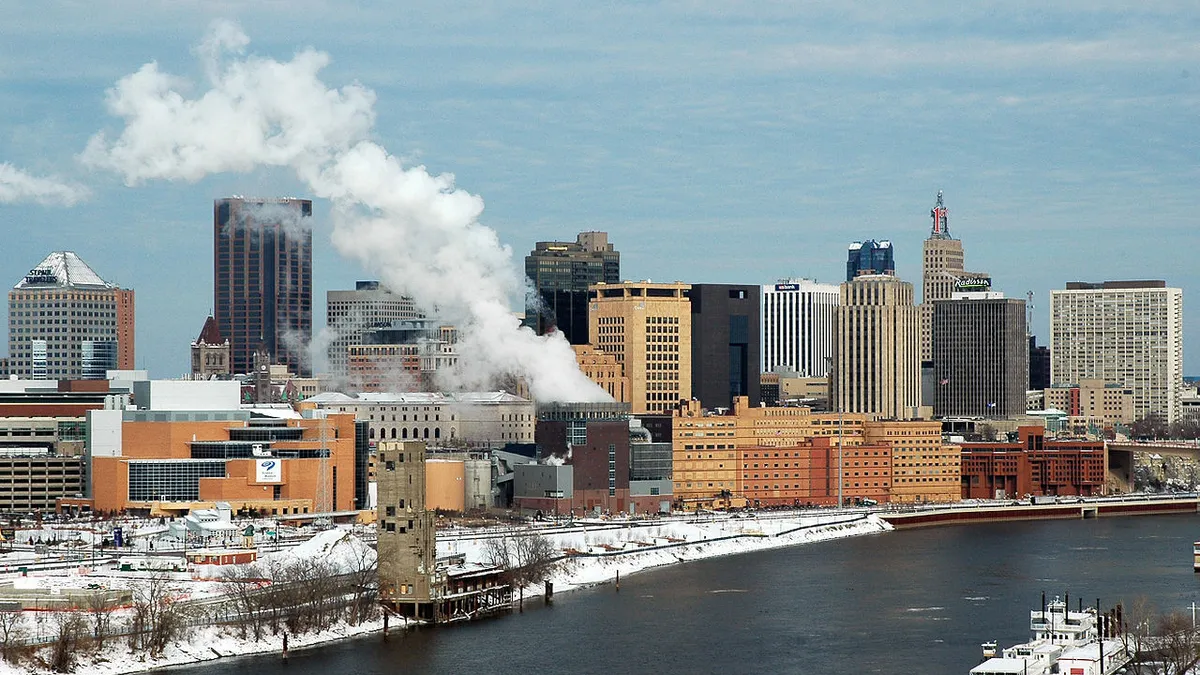UPDATE: In a 5-2 vote, the St. Paul City Council approved a deal for organized trash collection in the city, as reported by the Star Tribune. The deal, approved Wednesday, will keep all 15 licensed haulers in the city in business, but rates, collection days and routes will be coordinated. Unlike systems in some other cities, haulers will organize themselves to determine who gets which collection routes.
The city will own trash carts, ranging from 32 gallons to 95 gallons in size. The collection fee for residents will vary depending on cart size and frequency of pickup. City officials anticipate the program will begin Oct. 1 of next year.
Dive Brief:
- City staff and 15 licensed haulers in St. Paul, MN, have negotiated a deal to consolidate collection that could begin as soon as Oct. 2018, as reported by Minnesota Public Radio. This proposed deal would see all 15 companies join together as one corporation to sign a contract with the city.
- The city received more than 2,000 public comments from residents and negotiations between the haulers and city staff took over a year, as reported by the Duluth News Tribune. The St. Paul City Council is scheduled to vote on the agreement Nov. 8.
- The negotiated agreement comes with many services built in for customers and an annual fee of $26.40 per household, which will be added to property taxes, as reported by the Twin Cities Pioneer Press. Residents can choose between 32-gallon, 65-gallon or 95-gallon carts, with monthly rates depending on the frequency of collection and the size of the cart. The agreement also comes with a negotiated "living wage" of $20 for truck drivers.
Dive Insight:
This agreement has been a long time coming for St. Paul. The 15 licensed haulers in the city have been attending meetings and negotiating with city officials since mid-2016, hammering out the details on pricing and collection schedules. A vote on an organized collection agreement was delayed twice over the summer, largely out of concern for differential pricing. Now, if the council votes to approve the negotiated deal, St. Paul would join other Minnesota cities, including Bloomington, Maplewood and Minneapolis, that already have organized collection systems.
St. Paul has had an open-market approach since the 1970s, which saw residents negotiating directly with waste haulers for their service. In some instances, this lead to situations where multiple trucks were driving down the same city block, multiple times a day. If approved by the council, the new system would guarantee only one hauler is assigned to each city block — though at least 51% of the city will have waste and recycling collected on the same day. While collection could begin as soon as Oct. 1, 2018, there is some concern in the city that the rollout of this new program may not be ready by then. Since city officials are trying to avoid making the same mistakes that came with rolling out a new recycling program, they have created a built-in delay that would push the start to April 2019 if the city isn't ready in time.
Organized collection can sometimes lead to backlash, which may be an unavoidable problem, though open public meetings and careful consideration of how all stakeholders will be affected can help mitigate those problems. Some of the top executives in the industry have agreed that franchise systems are the future of waste collection, and other cities are considering the establishment of their own, so this discussion can be expected to continue.













